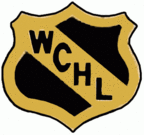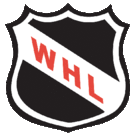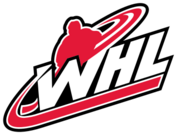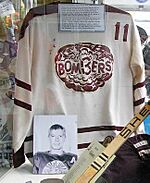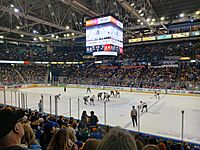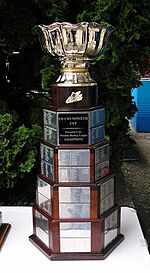Western Hockey League facts for kids
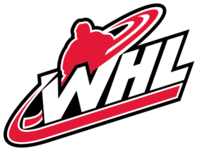 |
|
| Formerly | Canadian Major Junior Hockey League (1966–67) Western Canada Junior Hockey League (1967–68) Western Canada Hockey League (1968–1978) |
|---|---|
| Sport | Ice hockey |
| Founded | 1966 |
| Commissioner | Dan Near |
| No. of teams | 23 (24 by 2026) |
| Countries |
|
| Headquarters | Calgary, Alberta |
| Most recent champion(s) |
Medicine Hat Tigers (6) |
| Most titles | Kamloops Blazers & Medicine Hat Tigers (6) |
| TV partner(s) | Canada TSN RDS CBC United States KRCW-TV KZJO |
| Streaming partner(s) | Victory+ |
The Western Hockey League (WHL) is a top junior ice hockey league in Western Canada and the Northwestern United States. It's one of three main leagues that make up the Canadian Hockey League (CHL). The WHL is considered the highest level of junior hockey in Canada. The other two leagues are the Ontario Hockey League and the Quebec Maritimes Junior Hockey League.
Teams in the WHL play to win the Ed Chynoweth Cup. The team that wins this cup then gets to play for the Memorial Cup. The Memorial Cup is Canada's national championship for junior hockey. WHL teams have won the Memorial Cup 19 times! The WHL has 23 teams, which are split into two conferences and two divisions. The Eastern Conference has 11 teams from Manitoba, Saskatchewan, and Alberta. The Western Conference has 12 teams from British Columbia, Washington, and Oregon. By 2026, the league will grow to 24 teams with a new team in Chilliwack, British Columbia.
The league started in 1966 as the Canadian Major Junior Hockey League (CMJHL). It had seven teams in Saskatchewan and Alberta. In 1967, it was renamed the Western Canada Junior Hockey League (WCJHL). From 1968, it became the Western Canada Hockey League (WCHL). Finally, in 1978, it was named the Western Hockey League after teams from the United States joined.
The idea for the league came from Bill Hunter. He wanted a strong western league that could compete with teams from Ontario and Quebec. He worked with Scotty Munro, Del Wilson, and Jim Piggott to make it happen. At first, the league was not officially recognized by the Canadian Amateur Hockey Association. But in 1970, when junior hockey in Canada was reorganized, the WHL became a top junior league.
Contents
History of the WHL
How the League Started
Even though the Edmonton Oil Kings won the 1966 Memorial Cup, their owner, Bill Hunter, was worried about junior hockey in Western Canada. Each of the four western provinces had its own junior league. Hunter felt this made it hard for them to compete against bigger leagues in Ontario and Quebec. He wanted stronger competition.
Hunter's Oil Kings were playing in two different leagues at the time. During the 1966 Memorial Cup, Hunter shared his idea for a national junior hockey league. A leader from the Canadian Amateur Hockey Association (CAHA) said it was not possible.
CAHA told the Oil Kings they had to play full-time in one junior league for the 1966–67 season. If not, they couldn't play for the Memorial Cup. This led Hunter to support Estevan Bruins owner Scotty Munro's idea to create a new western junior league. Five teams from the Saskatchewan Junior Hockey League (SJHL) left to join the Oil Kings and the Calgary Buffaloes. They formed the Canadian Major Junior Hockey League (CMJHL).
Some people worried this new league would cause other leagues to disappear. The SJHL did fold right away. The local hockey groups in Alberta and Saskatchewan approved the new league. However, CAHA did not. They called the CMJHL an "outlaw league" and stopped its teams and players from playing in CAHA events, including the Memorial Cup. The new league said CAHA was going too far. With support from players and their families, they decided to play the season anyway. The CMJHL even started legal action in March 1967 to be allowed back into the Memorial Cup.
In May 1967, the CMJHL changed its name to the Western Canada Junior Hockey League (WCJHL). Four new teams joined, including the Swift Current Broncos and three teams from Manitoba. These were the Brandon Wheat Kings, Flin Flon Bombers, and Winnipeg Jets. A new agreement between CAHA and the National Hockey League (NHL) started in July 1967. This agreement changed how junior players could join the NHL.
With the agreement settled, CAHA finally approved the WCHL. This allowed the league champion Estevan Bruins to play for the 1968 Memorial Cup. But in May 1968, Hunter announced the league would use an age limit of 21. This was different from the CAHA-NHL agreement. The WCJHL said the lower age limit meant fewer talented players and hurt ticket sales. CAHA responded by suspending the league and its players again.
In June 1968, the WCJHL changed its name to the Western Canada Hockey League (WCHL). They also announced they were leaving CAHA to form their own group, the Canadian Hockey Association (CHA). Hunter became the chairman of the WCHL board. Ron Butlin became president of both the WCHL and the CHA.
Some teams, like the Pats, Canucks, and Red Wings, were worried about the WCHL's relationship with CAHA. They wanted to play for the Memorial Cup. So, they left before the 1968–69 season and joined a new Saskatchewan Junior Hockey League. At the end of that season, the CHA held its own national championship. The WCHL-champion Flin Flon Bombers played against the St. Thomas Barons from Ontario. But the Barons quit during the fourth game because they said the Bombers were playing too roughly. The Bombers were given the title. They then challenged the Memorial Cup champion-Montreal Junior Canadiens, but the Montreal team said no.
After many disagreements, Canadian junior hockey was reorganized in 1970. CAHA took in the CHA and approved the WCHL again. This made the WCHL one of the three top junior leagues. The others were the Ontario Hockey Association (now the Ontario Hockey League) and the Quebec Major Junior Hockey League (now the Quebec Maritimes Junior Hockey League). Then, in 1972, the Memorial Cup changed. It became a tournament where the champion from each major junior league played against each other.
- League logo timeline
Early Years of the WHL
In its first ten years, the league grew a lot. Teams moved to new cities as the league spread across Western Canada. The Flin Flon Bombers, with future NHL stars Bobby Clarke and Reggie Leach, became the first really strong team. They played in three finals in a row and won championships in 1969 and 1970.
The WCHL truly became a "western" league in 1971. The Estevan Bruins moved to British Columbia and became the New Westminster Bruins. Two new teams, the Victoria Cougars and Vancouver Nats, also joined.
In the mid-1970s, the New Westminster Bruins became the WCHL's first true "dynasty." They won four championships in a row from 1975 to 1978. The Bruins also won the Memorial Cup two years in a row in 1977 and 1978.
In 1976, the Oil Kings moved to Oregon and became the Portland Winter Hawks. This was the WCHL's first team in the United States. A year later, two more American teams joined: the Seattle Breakers and Billings Bighorns. With American teams now part of the league, the WCHL shortened its name to the Western Hockey League. The Flin Flon Bombers, despite their early success, faced challenges because their community was small and far away. In 1978, the team moved to Edmonton for a short time as the Oil Kings. The team moved again a year later and became the Great Falls Americans.
The 1980s in the WHL
The 1980s had some wild moments. There were big fights on the ice that needed police help. There was also a very unusual trade and a sad bus crash that took the lives of four players.
In the 1980–81 WHL season, the Medicine Hat Tigers' coach, Pat Ginnell, got into a fight with a linesman during a big brawl. Ginnell was found guilty of assault and suspended for 36 games. In March 1982, a huge fight between the Regina Pats and Calgary Wranglers led to fines and many player suspensions. Pats coach Bill LaForge also had a problem with a fan. He was found not guilty because the judge said it was hard to blame him when a fan was trying to get into the coach's area. LaForge left his job after that season.
On January 19, 1983, the Seattle Breakers traded a player named Tom Martin and $35,000 to the Victoria Cougars. In return, the Breakers received the Cougars' team bus! The Breakers couldn't sign Martin, who wanted to play in his hometown of Victoria. The Cougars couldn't use the bus they bought from another team because of taxes.
On December 30, 1986, a terrible accident happened to the Swift Current Broncos. Their bus slid off an icy highway and rolled over on the way to a game. Scott Kruger, Trent Kresse, Brent Ruff, and Chris Mantyka died in the crash. The Broncos retired their jersey numbers and added a special patch to remember the players. In 2016, a memorial was put up at the crash site. The WHL later renamed its award for the most valuable player the Four Broncos Memorial Trophy in their honor. In 1989, less than three years after the crash, the Broncos won the league title and the Memorial Cup.
The 1990s in the WHL
The 1990s saw more teams join the league. The WHL also returned to major cities in Western Canada. In 1991, the Spokane Chiefs became the second American team to win the Memorial Cup. The Kamloops Blazers became the WHL's second "dynasty." They won both the WHL Championship and the Memorial Cup three times in four years, between 1992 and 1995.
In 1995, the Calgary Hitmen joined the league. A group of investors, including Bret "the Hitman" Hart, started the team. The team got its name from him. Many worried if a WHL team could do well in a city that already had an NHL team. But the Hitmen were very successful. By 2004–05, they were getting as many as 10,000 fans per game.
The Edmonton Ice followed the Hitmen a year later. But that team didn't do well after only two seasons because of problems with the Edmonton Oilers. The team then became the Kootenay Ice in Cranbrook, British Columbia. They found more success there, even winning the 2002 Memorial Cup. This was special because Cranbrook is one of the smallest markets in the league.
The 21st Century in the WHL
In the 2000s, the league added four more teams. The Vancouver Giants joined in 2001. The Everett Silvertips joined in 2003. The Chilliwack Bruins joined in 2005 (this team later moved in 2011 and became the Victoria Royals). And the Edmonton Oil Kings joined in 2007. The Kelowna Rockets had a strong period, winning three WHL titles in 2003, 2005, and 2009. They also won the Memorial Cup as the host team in 2004.
In 2011, WHL teams played in two outdoor games for the first time. The Spokane Chiefs hosted the Kootenay Ice on January 15. On February 21, the Calgary Hitmen hosted the Regina Pats for a game connected to the 2011 Heritage Classic. A third outdoor game was held in Regina as part of the 2019 Heritage Classic. It was a rematch against the Hitmen.
The league was greatly affected by the COVID-19 pandemic starting in early 2020. The 2019–20 season was cut short, and the playoffs were canceled. The 2020–21 season was played differently. Teams played 24 games within their own divisions, and there were no playoffs. Because of this, neither the Ed Chynoweth Cup nor the Memorial Cup were given out in 2020 or 2021. The league went back to a normal schedule for 2021–22. The Oil Kings became the first team to win the Ed Chynoweth Cup since the Prince Albert Raiders in 2019.
WHL Teams
The WHL has 23 teams divided into two conferences. This makes it the largest league in the CHL. The Ontario Hockey League has 20 teams, and the Quebec Maritimes Junior Hockey League has 18. WHL teams are located across four Canadian provinces and two American states. The Eastern Conference has teams from Manitoba, Saskatchewan, and Alberta. The Western Conference has teams from British Columbia, Washington, and Oregon.
On March 24, 2025, the league announced a new team for Penticton, British Columbia. This team, the Penticton Vees, will start playing in the 2025–26 WHL season. The league also started looking for a new team in Chilliwack to begin playing in the 2026–27 WHL season.
The top eight teams in each conference make it to the playoffs. The winners of each division are the top two teams for the first round of the playoffs. In the second round, the four remaining teams in each conference are ranked again based on their regular season points.
| Division | Team | City | Arena | Founded | Joined |
|---|---|---|---|---|---|
| Central | Calgary Hitmen | Calgary, Alberta | Scotiabank Saddledome | 1994 | 1995 |
| Edmonton Oil Kings | Edmonton, Alberta | Rogers Place | 2006 | 2007 | |
| Lethbridge Hurricanes | Lethbridge, Alberta | VisitLethbridge.com Arena | 1967* | ||
| Medicine Hat Tigers | Medicine Hat, Alberta | Co-op Place | 1970 | ||
| Red Deer Rebels | Red Deer, Alberta | Marchant Crane Centrium | 1991 | 1992 | |
| East | Brandon Wheat Kings | Brandon, Manitoba | Keystone Centre | 1936 | 1967 |
| Moose Jaw Warriors | Moose Jaw, Saskatchewan | Mosaic Place | 1980* | ||
| Prince Albert Raiders | Prince Albert, Saskatchewan | Art Hauser Centre | 1971 | 1982 | |
| Regina Pats | Regina, Saskatchewan | Brandt Centre | 1917 | 1966 | |
| Saskatoon Blades | Saskatoon, Saskatchewan | SaskTel Centre | 1964 | 1966 | |
| Swift Current Broncos | Swift Current, Saskatchewan | InnovationPlex | 1967* | ||
| Division | Team | City | Arena | Founded | Joined |
|---|---|---|---|---|---|
| B.C. | Kamloops Blazers | Kamloops, British Columbia | Sandman Centre | 1966* | |
| Kelowna Rockets | Kelowna, British Columbia | Prospera Place | 1991* | ||
| Penticton Vees | Penticton, British Columbia | South Okanagan Events Centre | 1961 | 2025 | |
| Prince George Cougars | Prince George, British Columbia | CN Centre | 1962 | 1971* | |
| Vancouver Giants | Langley, British Columbia | Langley Events Centre | 2001 | ||
| Victoria Royals | Victoria, British Columbia | Save-On-Foods Memorial Centre | 2005 | 2006* | |
| U.S. | Everett Silvertips | Everett, Washington | Angel of the Winds Arena | 2001 | 2003 |
| Portland Winterhawks | Portland, Oregon | Veterans Memorial Coliseum | 1949 | 1966* | |
| Seattle Thunderbirds | Kent, Washington | accesso ShoWare Center | 1971* | ||
| Spokane Chiefs | Spokane, Washington | Spokane Veterans Memorial Arena | 1982* | ||
| Tri-City Americans | Kennewick, Washington | Toyota Center | 1966* | ||
| Wenatchee Wild | Wenatchee, Washington | Town Toyota Center | 1996* | ||
* Means the team moved from its original city.
Future Teams
| Team | City | Arena | Founded | Joining |
|---|---|---|---|---|
| Chilliwack | Chilliwack, British Columbia | Chilliwack Coliseum | 2025 | 2026 |
Team History Timeline
Note: Teams that are currently in the league are shown in blue. Gold stars mean they won a league championship.
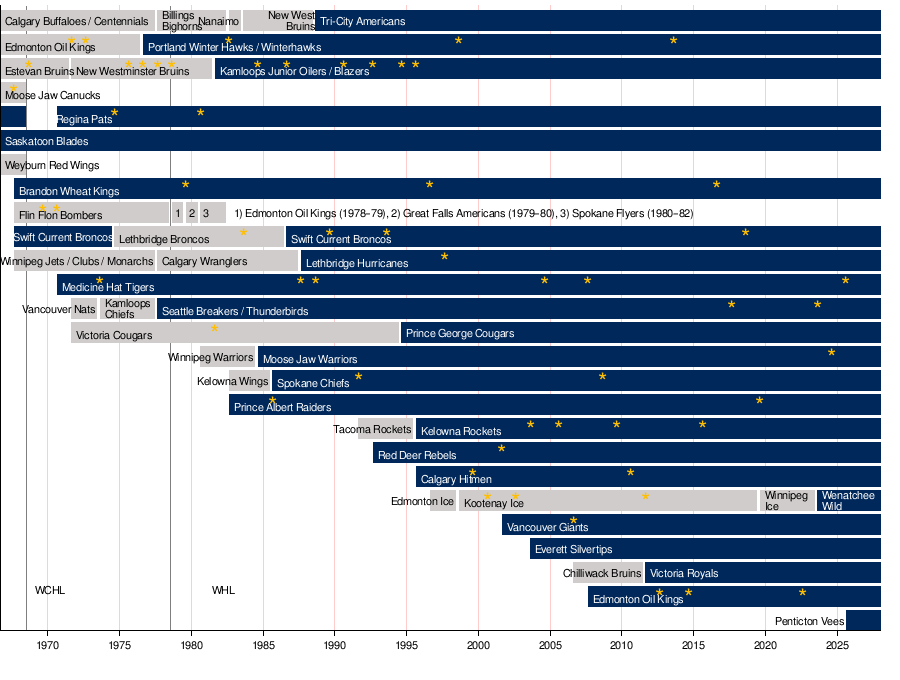
Team Name Changes
Here's how some teams have changed their names and locations over time:
- Calgary Buffaloes (1966–67) became Calgary Centennials (1967–77). Then they became Billings Bighorns (1977–82), then Nanaimo Islanders (1982–83), then New Westminster Bruins (1983–88). Finally, they became the Tri-City Americans (1988–present).
- Edmonton Oil Kings (1966–76) became Portland Winter Hawks (1976–2009). Now they are the Portland Winterhawks (2009–present).
- Estevan Bruins (1966–71) became New Westminster Bruins (1971–81). Then they became Kamloops Junior Oilers (1981–84). Now they are the Kamloops Blazers (1984–present).
- Moose Jaw Canucks (1966–68)
- Regina Pats (1966–68, 1970–present)
- Saskatoon Blades (1966–present)
- Weyburn Red Wings (1966–68)
- Brandon Wheat Kings (1967–present)
- Flin Flon Bombers (1967–78) became Edmonton Oil Kings (1978–79). Then they became Great Falls Americans (1979–80), then Spokane Flyers (1980–82).
- Swift Current Broncos (1967–74) became Lethbridge Broncos (1974–86). Now they are the Swift Current Broncos (1986–present).
- Winnipeg Jets (1967–73) became Winnipeg Clubs (1973–76). Then they became Winnipeg Monarchs (1976–77), then Calgary Wranglers (1977–87). Now they are the Lethbridge Hurricanes (1987–present).
- Medicine Hat Tigers (1970–present)
- Vancouver Nats (1971–73) became Kamloops Chiefs (1973–77). Then they became Seattle Breakers (1977–85). Now they are the Seattle Thunderbirds (1985–present).
- Victoria Cougars (1971–94) became the Prince George Cougars (1994–present).
- Winnipeg Warriors (1980–84) became the Moose Jaw Warriors (1984–present).
- Kelowna Wings (1982–85) became the Spokane Chiefs (1985–present).
- Prince Albert Raiders (1982–present)
- Tacoma Rockets (1991–95) became the Kelowna Rockets (1995–present).
- Red Deer Rebels (1992–present)
- Calgary Hitmen (1995–present)
- Edmonton Ice (1996–98) became Kootenay Ice (1998–2019). Then they became Winnipeg Ice (2019–2023). Now they are the Wenatchee Wild (2023–present).
- Vancouver Giants (2001–present)
- Everett Silvertips (2003–present)
- Chilliwack Bruins (2006–11) became the Victoria Royals (2011–present).
- Edmonton Oil Kings (2007–present)
- Penticton Vees (2025–present)
Player Rules
The WHL bantam draft is an event each year where teams pick players who are 14 or 15 years old. The team that picks first depends on how well they did in the league standings.
Players aged 15 to 20 can play in the WHL, but there are some rules. Fifteen-year-olds can only play five games unless their team's season has ended. Also, each team can only have three 20-year-old players on their roster. New teams can have five 20-year-olds. Each team can also have only two players who are not from North America. Teams can pick these players through the CHL Import Draft.
Each of the three CHL leagues has special rights to players from certain areas in North America. The WHL has rights to players from the four western provinces of Canada. They also have rights to players from the American Pacific Northwest and all other American states west of the Mississippi River (except Missouri). This also includes players from the Yukon, Northwest Territories, and Nunavut.
Special Player Status
In 2005, the CHL created a "special status" rule. This allows certain players to play full-time in a CHL league as a 15-year-old. In 2020, Connor Bedard was the first player to get this special status for the WHL. He was the seventh player overall to get it since 2005. The Regina Pats picked Bedard in the 2020 bantam draft. In 2024, Landon DuPont became the second player to get this special status for the WHL. He was the ninth player overall. The Everett Silvertips picked DuPont in the 2024 bantam draft.
Education for Players
Most players in the WHL are still in school. So, the league helps them with their education. Teams have academic advisors who check on how players are doing in school. The league also has a Director of Education Services. The WHL also has a scholarship program. For every season a player plays in the WHL, they can get one full year of Canadian university tuition, textbooks, and fees paid for. Since this program started in 1993, over 3,000 scholarships have been given out. By 2008, these scholarships were worth over CA$9 million. Canadian universities and colleges often look for players from the WHL. This gives graduating players a chance to keep playing hockey in U Sports while they go to college.
Until 2024, the National Collegiate Athletic Association (NCAA) in the United States had rules that made it hard for CHL players to play college hockey. This was because CHL players received money and could sign certain contracts. Players who wanted scholarships to American universities often had to play in other junior leagues, like the British Columbia Hockey League or the United States Hockey League. This helped them keep their NCAA eligibility.
However, in August 2024, a legal challenge was started by a former CHL player. This challenge said the NCAA's rule was unfair. The next month, Regina Pats player Braxton Whitehead became the first CHL player to say he would play for an NCAA team. In November 2024, the NCAA voted to allow CHL players to play college hockey starting in the 2025–26 season. This was a big change from their old rules.
Champions and Awards
Memorial Cup Winners
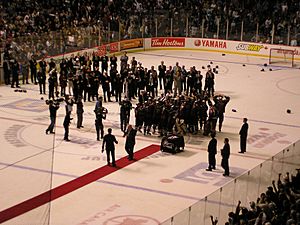
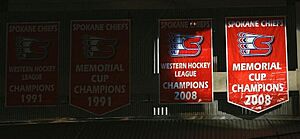
WHL teams get to play in the yearly Memorial Cup tournament by winning the WHL playoff championship. Since 1983, the team that hosts the tournament also gets to play. Overall, WHL teams have won the Memorial Cup nineteen times since the league began.
|
|
|
League Records
| Statistic | Total | Team | Season |
|---|---|---|---|
| Most points | 125 | Brandon Wheat Kings | 1978–79 |
| Most wins | 60 | Victoria Cougars | 1980–81 |
| Most wins, first season | 35 | Everett Silvertips | 2003–04 |
| Most goals scored | 496 | Kamloops Blazers | 1986–87 |
| Fewest goals against | 125 | Kelowna Rockets | 2003–04 |
| Statistic | Player | Total | Season |
|---|---|---|---|
| Most goals | Ray Ferraro | 108 | 1983–84 |
| Most assists | Rob Brown | 136 | 1986–87 |
| Most points | Rob Brown | 212 | 1986–87 |
| Most points, rookie | Petr Nedved | 145 | 1989–90 |
| Most points, defenceman | Cam Plante | 140 | 1983–84 |
WHL Awards
| Award | What it's for | Most recent winner |
|---|---|---|
| Ed Chynoweth Cup | Playoff champion team | Medicine Hat Tigers |
| WHL Playoff MVP | Best player in the playoffs | Harrison Meneghin (Medicine Hat Tigers) |
| Scotty Munro Memorial Trophy | Best team in the regular season | Everett Silvertips |
| Four Broncos Memorial Trophy | Player of the year | Jagger Firkus (Moose Jaw Warriors) |
| Doc Seaman Trophy | Player who is best at school | Noah Chadwick (Lethbridge Hurricanes) |
| Bob Clarke Trophy | Player who scores the most points | Jagger Firkus (Moose Jaw Warriors) |
| Brad Hornung Trophy | Most sportsmanlike player | Brayden Yager (Moose Jaw Warriors) |
| Bill Hunter Memorial Trophy | Top defenceman (defense player) | Denton Mateychuk (Moose Jaw Warriors) |
| Del Wilson Trophy | Top goaltender (goalie) | Brett Mirwald (Vancouver Giants) |
| Jim Piggott Memorial Trophy | Top new player (rookie) | Gavin McKenna (Medicine Hat Tigers) |
| WHL Plus-Minus Award | Best plus-minus rating (how many goals scored vs. allowed when on ice) | Zac Funk (Prince George Cougars) |
| Dunc McCallum Memorial Trophy | Top coach | Mark Lamb (Prince George Cougars) |
| Lloyd Saunders Memorial Trophy | Top executive (manager) | Mark Lamb (Prince George Cougars) |
| Allen Paradice Memorial Trophy | Top official (referee/linesman) | Jeff Ingram |
| Doug Wickenheiser | Player who helps the community the most | Ty Hurley (Kelowna Rockets) |
| St. Clair Group Trophy | Best public relations (how well the team connects with fans) | Edmonton Oil Kings |
League Leaders
- Frank Boucher (Commissioner), 1966–1968
- Ron Butlin (President), 1968–1971
- Jim Piggott (President) & Tom Fisher (Executive Secretary), 1971–1972
- Del Wilson (President) & Tom Fisher (Executive Secretary), 1972–1973
- Ed Chynoweth (President), 1973–1979
- David Descent (President), 1979–1980
- Ed Chynoweth (President), 1980–1995
- Dev Dley (Commissioner), 1995–2000
- Ron Robison (Commissioner), 2000–2024
- Dan Near (Commissioner), 2024–present
More About Hockey
- List of ice hockey leagues
- CHL/USA Prospects Challenge
 | Sharif Bey |
 | Hale Woodruff |
 | Richmond Barthé |
 | Purvis Young |


